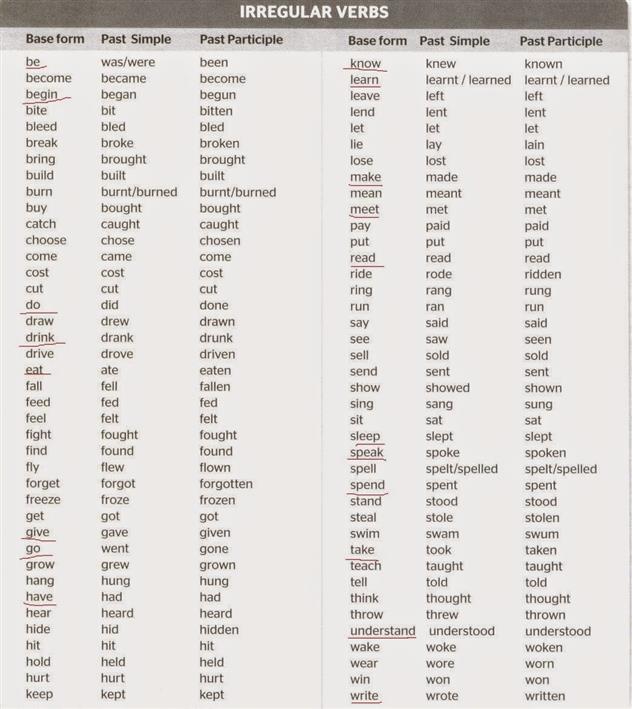
– I’ve felt at ease with everybody at the party. – She used to ride horses on her uncle's farm when she was a child. – She used to ride horses on her uncle's farm when she was a kid. – It’s the first time I’ve driven a car – It's the first time I drive a car. English and see how simple it is to create hypotheses using them and couple their use to your own vocabulary and buildings: Note in the list below some sentences that include irregular verbs widely used in the language in their composition. See too: 12 love phrases in english sentences with irregular verbs There is no set rule that can be memorized or taught, and only practice (never the urge to memorize all they in one day, please) can make you not make mistakes when it comes to conjugating or applying a verb in a sentence irregular. It is only the way they are to be used and conjugated in past tenses that differentiates them from regular verbs and makes them an irregular verb. – To spring (infinitive) – Sprang(passing simple) – sprung(past participle) = jump, jump. – To lead (infinitive) – Lead (simple past) - Lead(past participle) = lead, lead, command.Īnd, there are others that will have a verbal form in the simple past and a different one in the past participle, see the example: We have some irregular verbs that will have the same simple past and past participle, as you can see below: Since they vary with respect to their simple past and their past participle. When you learn regular verbs, you start to think that irregulars will be complicated, that they will have to be decorated since there is no such clear rule as to what to add and what to replaces. – To study (infinitive) – studied(simple past) - studied(past participle) = Study. In such cases it will be necessary to remove this consonant and replace it with vowel I before the ED is added. Some verbs, when placed in the past tense, change spelling (Photo: depositphotos)Īs for regular verbs, the biggest complication arises when we have a verb ending in Y. A verb becomes regular when it has in the past simple and participle forms only the addition of "D" or "ED" as you can see in the verbs: What are irregular verbs in English?Īll English verbs have three main verb forms which are called “ Infinitive"(infinitive, for us), " Past simple" (simple past) and " Past participate" (past participle).
#List of all english irregular verbs how to#
In this text you will have a Verbs List irregularities in English with their translations and another contemplating examples of sentences that take these verbs for the study of matter is made easier and you no longer have to rack your brain about how to start practicing until you have a language very close to the native. It just takes a little practice to make them seem as natural as regular English verbs. Their nomenclature makes it look like they are an exception, when in fact they are as simple as the others to use. Matthew Barton (copyright) / Creator of Englishcurrent.You irregular verbs in english often create confusion at the time of learning, this is even due to the term they carry. Questions? Found a mistake? Leave a comment below. Of course, there are many more irregular verbs in English. I hope these exercises on irregular verbs have been useful. Even though it was damaged, her friend (forgive) her when she returned it. She had (tear) it and also (bleed) onto it a little.

One day irregular verbs may disappear from English, but for now, it’s important for every student to learn them. Scroll down or click here to do exercises on the above irregular verb list for beginner students. Here is a list of 45 irregular verbs that beginner ESL students should learn. There are over 400 English verbs that use an irregular form. Passive Voice ( be + past participle): My arm was broken yesterday.Past Perfect ( had + past participle ): I hadn’t broken my arm until I started snowboarding.

Present Perfect ( have + past participle): I have broken my arm twice in my life.How to Teach English Conversation Class.'Be used to'" / 'Use to' / 'Get used to'.The Difference between "Other" & "Another".The Difference between 'a few/few/a little/little'.


 0 kommentar(er)
0 kommentar(er)
